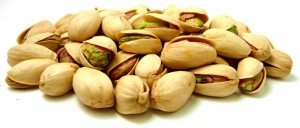Nuts and other low moisture foods can be a source of Salmonella. That’s not new. But many folks in the low-moisture foods industries are now conducting risk assessments and validating interventions (like pasteurization) to keep the Salmonella out of the hands of bar patrons everywhere.
The almond industry led the way about a decade ago. The peanut industry, in the wake of two outbreaks followed. According to Growing Produce, the pistachio industry is working with friend of barfblog (and known to her close friends as at the almond queen) Linda Harris and Michigan State’s Bradley Marks on some validation work.
“At this point in our world, Salmonella is a hazard that is reasonably likely to possibly occur in low-moisture products like nuts. It’s happened before, so we have to assume it’s possible it could happen again,” Marks says. “That being the case, the proposed rules of FSMA require that the processor have a validated process that they can document that they’ve shown achieves the food safety objective.”
Marks and his colleagues are currently working on lab-scale research to evaluate the effects of the pasteurization process and product conditions on the resistance of Salmonella to heating. “We’re doing some mathematical modeling so we can understand the rate of Salmonella activation as a function of temperature, time, and conditions of the product or the process itself,” Marks says.
The second part of the project will involve similar work on a pilot scale. “We have a system where we can inoculate pistachios with Salmonella and subject them to a process like a flatbed roaster,” Marks says. “So we are looking at validating that our prediction of the inactivation of Salmonella is correct, and that a non-pathogenic surrogate (Enterococcus faecium) also is reliable as a means to validate the process.”
Marks is working closely with Linda Harris, co-principal investigator for the Western Center for Food Safety at the University of California, Davis, to develop guidelines and on-site workshop training for pistachio processors. The guidelines and training will focus on what needs to be measured and documented to meet the FSMA requirements.
